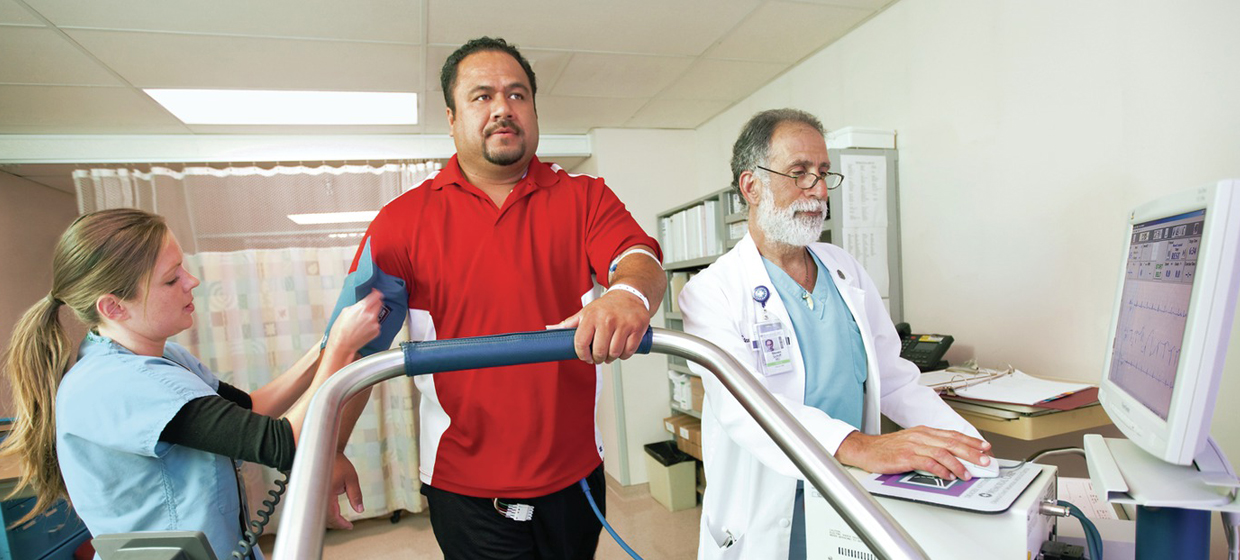Physicians Who Specialize in Heart & Vascular Disease and Conditions
If you think you may be experiencing a heart attack, it is important to call 9-1-1 immediately so treatment can start as soon as possible. Do not drive yourself or wait for a ride from a friend or family member. Have an ambulance take you to the hospital that is a Cardiac Receiving Center right away.
Designated Cardiac Receiving Centers
Physicians Who Treat Heart & Vascular Disease
Selecting physician specialists to treat your heart and vascular disease or condition is an important decision to make. When selecting a team of physicians it is important to look for specialists who are highly trained in their fields. The comprehensive teams of expert heart and vascular care specialists at MemorialCare Heart & Vascular Institutes located in Orange County and Los Angeles County are devoted to innovative heart care to improve the lives of residents in Southern California.
Why are there so many different heart and vascular specialists?
Heart and vascular disease and conditions can be treated effectively with a team of cardiologists, interventional cardiologists, cardiothoracic / thoracic surgeons, vascular surgeons, and cardiac electrophysiologists who are highly trained in heart and vascular care. Specialists will work as a team and with you to develop a comprehensive strategy to treat your heart and vascular disease or condition aiming for best possible results and rapid recovery.
What does each heart and vascular specialist do?
Physicians across several board-certified specialties team together to help treat heart and vascular disease and conditions.
- Cardiologist – A physician who is specialized in diagnosing and treating heart and vascular diseases or conditions.
- Interventional Cardiologist – A subspecialty of cardiology, a physician who is specialized in minimally invasive, catheter based treatments and procedures such as angioplasty, stenting, catheter ablation, and insertion of pacemakers and implantable cardioverter defibrillators.
- Cardiothoracic / Thoracic Surgeon – A subspecialty of general surgery, a surgeon who is specialized in surgical procedures affecting organs inside the thorax (the chest) to treat conditions of the heart and or lungs. Procedures range from minimally invasive, beating-heart to open heart surgery.
- Vascular Surgeon - A subspecialty of general surgery, a surgeon who is specialized in surgical procedures affecting arteries and veins in the vascular system. Procedures range from minimally invasive catheter procedures to reconstructive surgery.
- Cardiac Electrophysiologist (Cardiac EP) – A subspecialty of cardiology, a physician who is specialized in heart-rhythms. Procedures range from electrophysiology studies to minimally invasive procedures such as catheter ablation, pacemakers and implantable cardioverter defibrillators implants.
- Radiologist – A physician who is specialized in interpreting images taken within the human body included the heart and vascular system in order to diagnose disease and abnormalities. Radiologists are well versed in various imaging modalities such as X-rays, computed tomography (CT), magnetic resonance imaging (MRI), and ultrasound.
- Nuclear Radiologist – A subspecialty of radiology, a physician who is specialized in imaging modalities and scans that involve a radioactive tracer such as positron emission tomography (PET), positron emission tomography/computed tomography (PET/CT), nuclear studies, and angiographs.
In addition to heart and vascular specialists, other medical professionals may be involved in your heart and vascular treatment, including:
- Cardiac Rehabilitation Specialists – A professional who establishes a cardiac rehabilitation plan to improve recovery from a heart and vascular condition and teaches exercises and lifestyle changes designed to strengthen your overall health and well-being.
- Clinical Nurse Specialist (CNS), Acute Care Nurse Practitioners (ACNP) and Care Managers – A professional who coordinates all aspects of your individualize heart and vascular care from pre to post surgery.
- Imaging Technologist: CT Scan Technologist, MRI Technologist, Nuclear Medicine Technologist, Radiation Technologist, Radiology Technologist, Ultrasound Technologist – A professional who helps place you in the correct position in advanced imaging equipment such as CT scans, MRI scans, nuclear medicine, PET scans, mammography, radiology procedures and ultrasounds to take accurate images of your heart and vascular system.
How to find a heart and vascular specialist
If you think you may be experiencing a heart attack, it is important to call 9-1-1 immediately so treatment can start as soon as possible. Do not drive yourself or wait for a ride from a friend or family member. Have an ambulance take you to the hospital that is a Cardiac Receiving Center right away.
Designated Cardiac Receiving Centers
First, talk to your primary care physician and ask them for a referral to a cardiac specialist. To find a cardiologist, interventional cardiologist, cardiothoracic / thoracic surgeon, vascular surgeon, or cardiac electrophysiologist, search in our Find a Provider directory.
